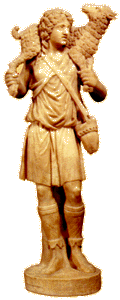
The Roman Dacians' Christianization

Exclusively Christian terms
Crestin" (in English , "Christian") comes from the vulgar Latin word "chrestianus". This word is very old, because as soon as someone converted to the new religion, he was named "chrestinus
", from "Chrestus" or "Crestus", the name of the Saviour in vulgar Latin12. "A boteza" (in English, "to baptise") has its origins in "baptisto,-are", which comes from the Greek term " "Casatorie" (in English, "marriage") comes from the Latin word "casa" (in Romanian, "casa" - word that means
"house"). In some documents there was found the archaic adjective "casatoriu" with the meaning of a man with a house and family. "Cuminecare
" (in English, to give somebody the Eucharist) comes from "communico,-are" or, in popular Latin, "cumenecare". This last term appears even in some old Romanian texts.
"Imparatia lui Dumnezeu"13 (in English, "God's Empire/ Kingdom") has its origins in "imperium" and "Domine Deus". "Cer,
ceruri"(heaven,-s) from "Imparatia cerurilor" (in English, "the Kingdom in Heavens") comes from "coelorum"; "
Facatorul lumii" (in English, "the Maker of the world") comes from "facio,-ere" and "lumen,-inis" with the signification of "universe"14.
"Tata" (in English , "father" and "God the Father") comes from the Latin word "tata"15; "parinte
" - a term for a priest or a monk - has its origins in "parens,-entis"
ac now "parentem"; "Fiu" - "Dumnezeu Fiul" (in English, "God the Son') comes from "filius"; "Fecioara" (the Virgin Mother) from the
vulgar "fetiola" (girl) and "vargura" from "virgula"16. "Sant" (in English , "saint") comes from "
sanctus" and co-exists with the old Slavic term "sfant". The word "sant" is present now in the names of the saints' celebrations: "Sant Petru" (Saint Peter), "Santa Marie"
(Saint Mary), "Sant Ion" (Saint John). "Cruce" (in English, "cross") comes from "crux", ac. "crucem". "Pacat
" ("sin") comes from "pecatum"; "Rugaciune" ("prayer") from "rogatio", now "rogationem"17; "a crede
" ("to believe") from "credo,-ere"; "blastamare" ("curse") from "blasphemare"; "
binecuvantare" ("blessing") from "bine" + "conventum" (now from "conventus", in Romanian "cuvant" and in English "word"). "
Preot" (in English, "priest") comes from the Greek term "presbiter" or, in a popular form, "prebiter"; "episcop" ("bishop") comes from "
episcopus", word that also appears in some old texts as "piscup". "Boboteaza"18, "Botezul Domnului" (the Baptism) is formed from the words "apa
" and "boteaza" or from the old Slavic term "Bog", with the meaning of "God", and "boteaza". "Judecata de Apoi
" ("Doomsday") comes from "judicatum" and "Gheèna" ("hell") from the Hebrew-Greek term "ghê hinnôm" that in Latin took the form "gehenna". "A invia" ("to revive") is formed with the prefix "in" and "via" , verb that comes from "vivo,-ere"; "
a rascumpara"19 ("to redeem") comes from "ras" and "cumparare" from the Latin term "comparo,-are"; "a inalta"20
("to raise") from "in" and "altaro,-are". These are only a few examples of words created with the characteristic adaptations of the Romanian language.
12
In those times, by "Christian" was meant both woman and man. 13 In the west, "regnum Dei". 14 In the west, "creator mundi". 15
In the west, "pater". 16 In the west, "virgo". 17 In the west, "oratio". 18 In the west, "epiphania". 19
In the west, "redemptio". 20 In the west, "assumptio".

